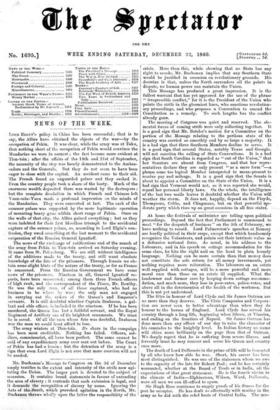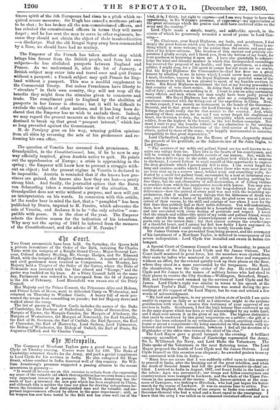At home the festivals of midwinter are telling upon political
proceedings. Beyond the fact that Parliament is summoned to meet " for the despatch of business " on the 5th of February, we have nothing to record. Lord Palmerston's speeches at Romsey are hardly political in their soope, except that which handsomely recognizes the Volunteers, and points out their intrinsic value as a defensive national force. As usual, in his address to the Labourers, and in his speech on cottage accommodation for the same class, he hits the right nail on the head in plain homely language. Nothing can be more certain than that money does not constitute the sole return for all money investments, yet nothing requires more reiteration. The labourers on an estate well supplied with cottages, will be a more powerful and more moral race than those on an estate ill supplied. What thel landowner and farmer save by keeping down cottage accommo- dation, and much more, they lose in poor-rates, police-rates, and above all in the deterioration of the health of the workmen. But this is not yet understood.
The fetes in honour of Lord Clyde and Sir James Outram are no more than they deserve. The Civic Companies and Corpora- tion are never seen to better advantage than when they do honour to the heroes of England. Lord Clyde has served his country through a long life, beginning when fifteen, at Yimeira, and ending on the frontiers of Nepaul. Sir James Outram has done more than any officer of our day to raise the character of his comrades to the knightly level. In Indian history no name will shine more brilliantly on the page than that of Outram.
We deeply regret that he is suffering from severe illness, and fervently trust he may recover and serve his Queen and country once more.
The death of Lord Dalhousie in the prime of life will be lamented by all who know how able he was. Short, his career has been most distinguished. He was one of the statesmen whom we owe to the sagacity of the late Sir Robert Peel; and he has certainly warranted, whether at the Board of Trade or in India, all the .expectations of that great statesman. He is the fourth victim to the climate of India—Elphinstone, Wilson, Ward, Dalhousie, were all men we can ill-afford to spare. Sir Hugh Rose continues to supply proofs of his fitness for the post he occupies. He has dealt as effectually with mutiny in the army as he did with the rebel hosts of Central India. The mu- tinous spirit of the 5th Europeans had risen to a pitch which re- quired severe measures. Sir Hugh has caused a mutinous private to be shot ; he has broken all the non-commissioned officers, and has rebuked the commissioned officers in terms they will never forget ; and he has sent the men to serve in other regiments, be- cause they should not obtain the object of their insubordination —a discharge. Had the old Bengal Sepoy army been commanded by Rose, we should have had no mutiny.



























